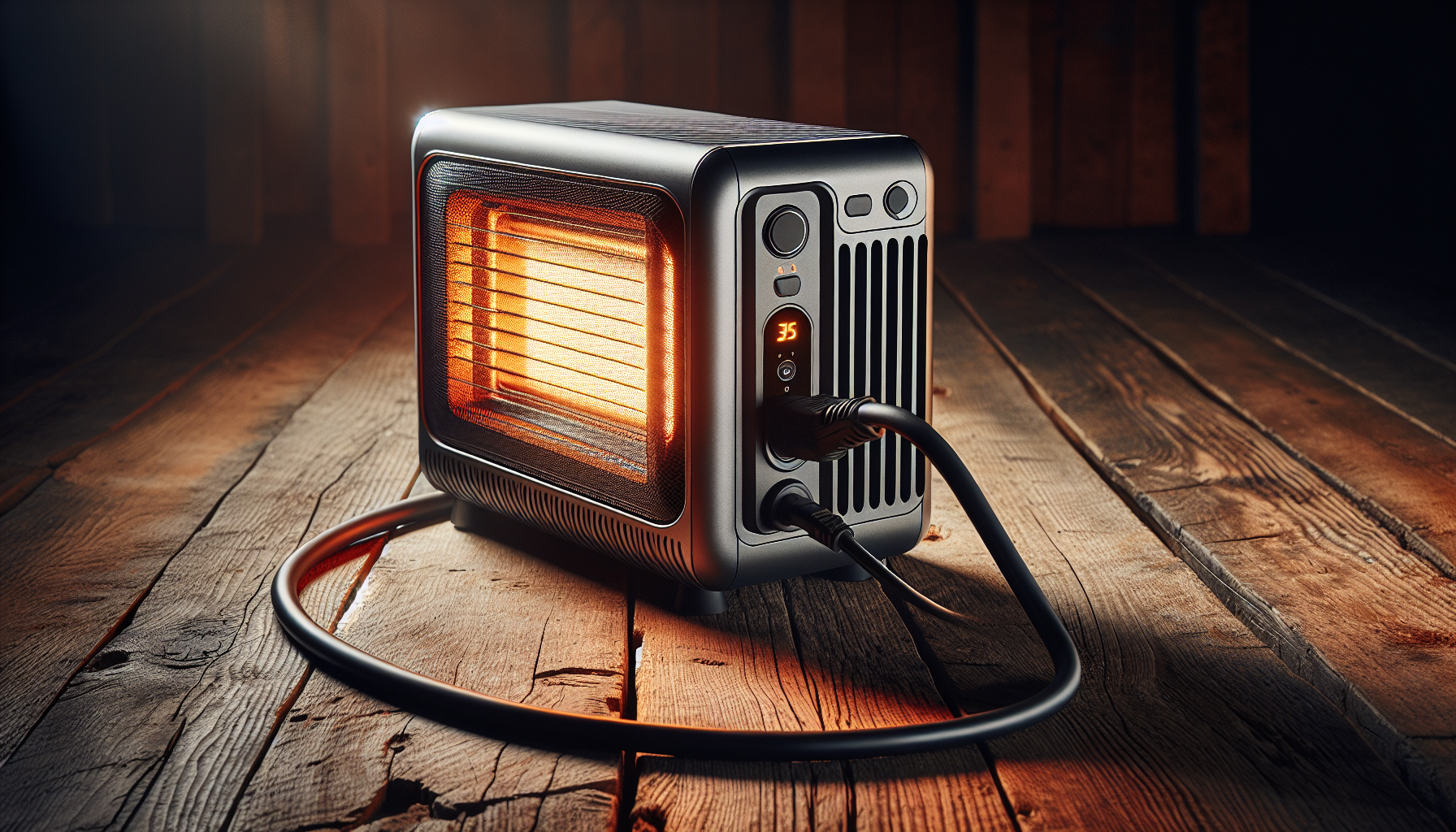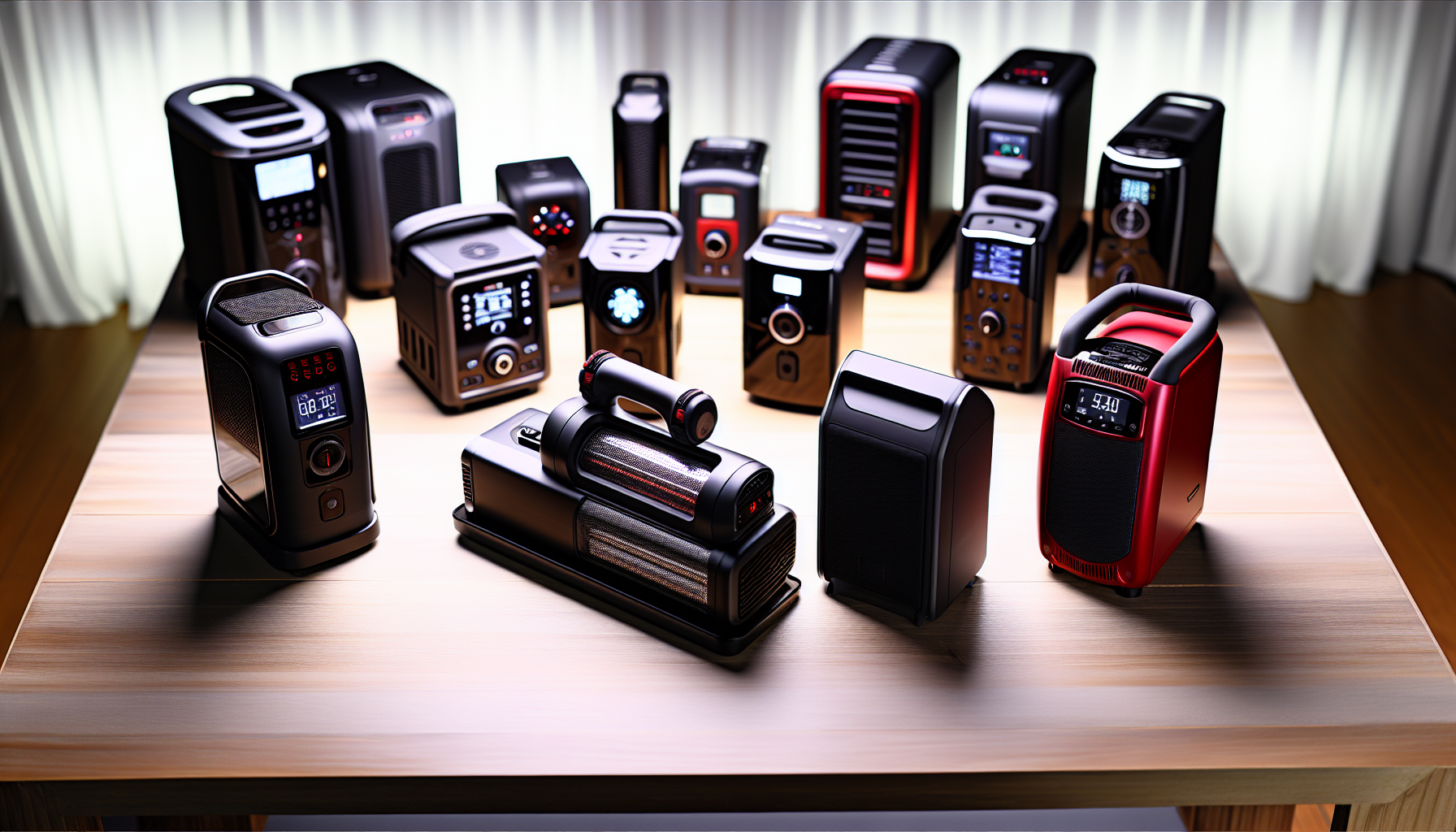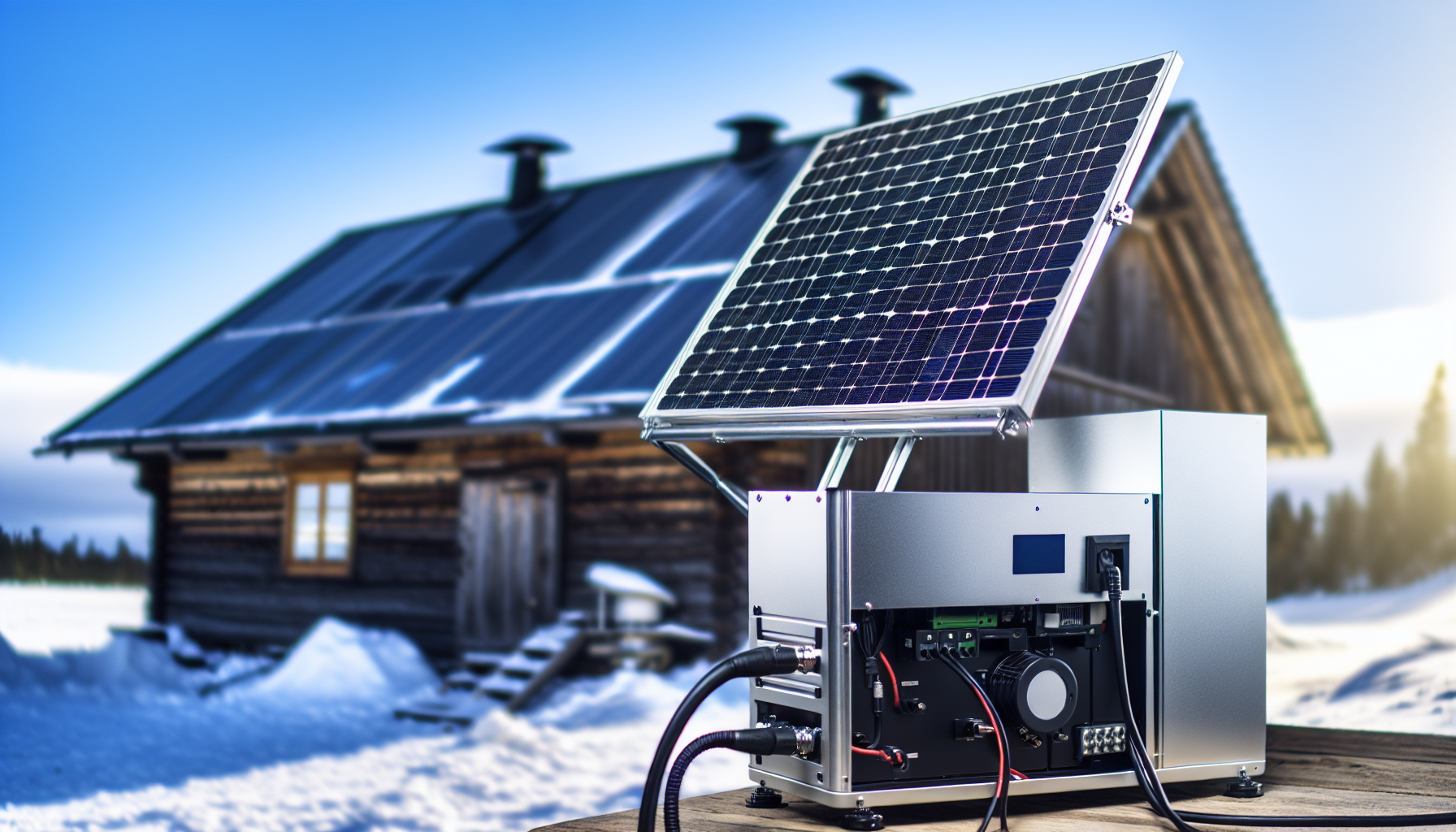Are you wondering, “Can you run a space heater on a portable battery?” This is a common question for those needing heat in remote areas or during power outages. The short answer: is yes, but there are crucial considerations such as power output, battery capacity, and safety. In this article, we’ll explore the feasibility of powering space heaters with batteries, the requirements for doing so, and guidelines to ensure safe and effective operation.
Key Takeaways
- Powering a space heater with a conventional portable battery is generally impractical due to insufficient wattage and capacity; however, larger battery packs and portable power generators like the Jackery Explorer 1500 can accommodate the energy requirements of electric heaters for temporary off-grid use.
- The selection of a portable power station should be based on wattage compatibility with the space heater, battery capacity, performance, and charging options to ensure efficient and consistent heating for desired durations.
- When using portable battery-powered space heaters, especially propane or other fuel-based heaters indoors, essential safety precautions include proper ventilation to prevent carbon monoxide poisoning and adherence to storage and handling guidelines to mitigate risks.
Understanding Space Heaters and Portable Batteries

Both space heaters and portable batteries have significantly enhanced our ability to maintain comfort and convenience in a variety of environments. Space heaters, including electric and battery-operated types, are ubiquitous in tents, RVs, offices, and homes alike. They offer a reliable source of heat, making chilly rooms and spaces more livable during cold days. Battery-operated heaters, on the other hand, have taken the stage for off-grid situations, offering warmth in camping scenarios where traditional space heaters would be impractical.
Portable power stations, like the Jackery Explorer 1500, come equipped with lithium batteries that store energy and supply electricity to various devices, including portable heaters. Their portability and reliability have made them an indispensable tool for outdoor activities or during power disruptions. Nevertheless, using batteries to power space heaters presents certain challenges. The most significant of these is the limited energy storage capacity of batteries, which can restrict the duration of heat they can generate.
Types of Space Heaters
The selection of space heaters is vast, with each type having unique benefits and drawbacks. Some common types of space heaters include:
- Electric heaters: These offer convenience and low maintenance but can be costly to run.
- Propane portable heaters: These are portable and efficient but come with their own safety concerns, such as the need for proper ventilation.
- Oil-filled heaters: These provide long-lasting heat and are energy-efficient, but they take longer to heat up a room.
- Ceramic heaters: These heat up quickly and are energy-efficient, but they can be noisy.
When choosing a space heater, consider your specific needs and preferences to find the best option for you.
Non-electric space heaters that use gas, propane, or diesel present significant safety hazards, especially when used indoors. These heaters can lead to oxygen depletion and the risk of carbon monoxide poisoning if used without proper safety measures. Therefore, it’s essential to ensure proper ventilation and safety measures when using these heaters indoors.
Types of Portable Batteries
The variety of portable batteries matches the diversity of devices they power. When it comes to operating a space heater with a battery, you’ll need a substantial energy capacity, typically in the range of 1200-2200W. This requirement necessitates a large battery pack, comprising multiple high-capacity lithium batteries, to power space heaters continuously over extended periods.
However, the performance of a portable battery can be influenced by its size and weight. Larger and heavier batteries typically have higher capacity, but their portability may be diminished. Smaller and lighter batteries with higher energy density may be more efficient and better suited for portable devices.
Can a Battery-Operated Heaters Power a Space Heater?

The central question of our guide is the feasibility of a portable battery powering a space heater. In general, powering a space heater with a portable battery isn’t feasible due to inadequate wattage and capacity. However, with a larger battery pack or a portable power generator, you can sustain the operation of an electric heater for an extended period off-the-grid.
You must check the wattage requirements of the space heater and ensure that the portable power station has sufficient capacity. The inverter plays a crucial role in this process, converting DC electricity from the portable battery into AC power, which most space heaters require.
Utilizing a portable power station offers benefits such as:
- Portability
- Safety
- Convenience
- Energy efficiency
When using a powered heater, it’s essential to consider the energy consumption and safety features of the electric space heater, especially when it’s a battery powered heater.
Wattage Requirements of Space Heaters
Grasping the wattage requirements of space heaters is imperative when considering a battery-powered alternative. To understand how much power is needed, it’s important to note that typical wattage requirements for space heaters used to heat rooms and tents range between 1,500-1,600W. However, the wattage ratings for electric heaters can range from as low as 200W to as high as 4,000W.
120V AC electric heaters generally have wattage ratings ranging from 500 to 2000 watts. However, small space heaters, which are typically more suited for battery operation, have a wattage range between 750 and 1500 watts.
Battery Capacity and Performance
The capacity and performance of a battery significantly influence its ability to power a space heater. Here are some factors to consider:
- Capacity: The amount of electrode material contained in the cell determines the capacity of a portable battery. Larger cells with more electrode material have greater capacity.
- Size and weight: Larger and heavier batteries typically have higher capacity, but their portability may be diminished.
- Performance: The performance of a portable battery can also be influenced by its size and weight.
Another factor that can influence the performance of a portable battery is energy loss during operation. Energy loss can result in battery degradation, diminished capacity, and decreased overall efficiency. Therefore, it’s crucial to consider these factors when choosing a portable battery for your space heater.
Choosing the Right Portable Power Station for Your Space Heater
Selecting the appropriate portable power station for your space heater is a vital step to guarantee warmth in off-grid scenarios. A good power station should be able to meet the wattage requirements of your heater and have enough capacity to run it for the duration you need. Some top-rated portable power stations suitable for space heaters include:
- Jackery Explorer 1000
- EcoFlow Delta Pro
- Jackery Explorer 1500
- RAVPower 252.7
These power stations are equipped with lithium batteries that store energy and supply electricity to various devices, including portable heaters. They offer benefits such as:
- Portability
- Safety
- Convenience
- Energy efficiency when powering a space heater
Nonetheless, factors such as wattage compatibility, battery capacity, and charging options should be considered when selecting a portable power station.
Top Portable Power Stations for Space Heaters

The Jackery Explorer 1500 and BougeRV’s portable power stations, such as the Fort 1500, are highly recommended for powering space heaters due to their reliability, affordability, and specifications that support the operation of space heaters. The Jackery Explorer 1500, for instance, is well-equipped with a 1488Wh battery and three AC outlets, making it an excellent choice for powering a wide range of space heaters.
Customer feedback for the BougeRV Fort 1500 has been predominantly positive, with many highlighting its adequate power and effective charging capabilities. Another strong contender in the market is the Jackery Solar Generator 2000 Pro, which provides a substantial power output of 2,160Wh, making it a robust portable power solution for space heaters.
Factors to Consider When Choosing a Portable Power Station
When choosing a portable power station for your space heater, several factors need to be considered. One of the most important is wattage compatibility. You need to ensure that the power station can support the wattage requirements of the heater. If your space heater has a wattage rating of 1200 watts, for instance, you should choose a power station that can deliver at least that amount of power.
Battery capacity is another crucial factor. A larger battery capacity, ranging from 1100Wh to 1456Wh, is preferable for consistent and efficient heating. Other important considerations include the power station’s charging options and its size and weight, which can significantly impact its portability and ease of transportation.
Safety Precautions When Using a Portable Battery-Powered Space Heater

Although portable battery-powered space heaters are an excellent off-grid heating solution, they require certain safety precautions. The most significant of these is ensuring proper ventilation to prevent carbon monoxide accumulation, especially when using propane heaters. Having carbon monoxide detectors in place is also crucial to mitigating the risk of poisoning.
Beyond proper ventilation, following standard safety protocols is also crucial when operating a portable battery-powered space heater. These include ensuring appropriate storage to mitigate the risk of overheating or fire hazards.
Ventilation and Carbon Monoxide
Utilizing fuel-based space heaters, such as those that burn kerosene or oil, can present a potential risk of carbon monoxide poisoning. Symptoms of carbon monoxide poisoning include:
- headache
- weakness
- dizziness
- nausea
- shortness of breath
- confusion
Therefore, it’s crucial to have a carbon monoxide detector in place when using propane heaters or other fuel-based heaters. In addition to this, maintaining adequate ventilation in the room by slightly opening a window, especially in compact spaces, can decrease the risk of carbon monoxide poisoning.
Proper Storage and Handling
Proper storage and handling of portable power stations and space heaters are critical to prevent accidents and ensure longevity. It is recommended to store a portable power station in a cool, dry place, away from direct sunlight and heat sources, and to avoid exposure to moisture.
Handling a space heater safely is also crucial. Here are some safety tips to follow:
- Maintain a distance of at least 3 feet from any flammable materials
- Position the heater on a stable and nonflammable surface
- Create an exclusion zone free of children and pets around the heater
Following these tips can significantly reduce the risk of accidents.
Solar-Powered Alternatives for Off-Grid Heating
Solar-powered alternatives provide eco-friendly off-grid heating solutions, enabling you to stay warm without depending on conventional power sources. Among these alternatives are solar generators and solar heaters. A solar generator utilizes portable solar panels to harness solar energy, storing it as electricity in a solar battery. This stored energy can then be utilized to power a space heater, provided it aligns with the specified requirements.
Nevertheless, the efficiency of solar heaters can diminish in cloudy, rainy, or winter conditions, and they require correct alignment of solar panels towards the sun.
Solar Generators for Space Heaters

Solar generators, like the Jackery Solar Generator 1500 Pro and BougeRV Fort 1000, are excellent options for powering space heaters. They have high capacities and wattages, making them perfect for outdoor setups.
These generators offer substantial power when utilized appropriately. For instance, a 2,000-watt solar generator has the capability to operate a 1,500-watt space heater without encountering any complications. However, the price of solar generators for space heaters can vary, based on their capacity and functionalities.
Solar Heaters
Solar heaters offer a direct heating solution for small rooms or tents. They function by collecting cold air, heating it in a solar collector, and then circulating it back into the room. These heaters consist of solar panels, a duct system, and diffusers. Some heaters are equipped with fans, while others use natural ventilation to distribute air..
Solar heaters are efficient in heating small rooms or tents, particularly those that are 150 square feet or smaller. They are capable of effectively warming up the space, comparable to gas or propane heaters. As the air passes through the system, it is heated by the solar absorbing material and subsequently distributed into the living space.
Summary
As we’ve explored in this guide, powering a space heater with a portable battery or solar power is an achievable goal, but it comes with its own set of challenges and considerations. From understanding the types of heaters and batteries to considering the wattage requirements and battery capacity, every factor plays a crucial role in achieving a warm and cozy space in off-grid situations. While traditional power sources may not always be available, with the right information and precautions, you can still stay warm anywhere.
Frequently Asked Questions
Can a portable battery run a space heater?
No, a portable battery cannot run a space heater without an inverter to convert DC power to AC power. EcoFlow's solar generators and portable power stations have an inverter built-in for this purpose.
Can you run a space heater off of a Jackery?
It is unlikely to run a space heater off of a Jackery, as most space heaters use up to 1,500 watts to run, well above the Jackery 500's max of 500 watts.
What are the safety precautions to follow when using a portable battery-powered space heater?
When using a portable battery-powered space heater, it's crucial to ensure proper ventilation to prevent carbon monoxide accumulation and adhere to standard safety protocols, including appropriate storage to mitigate the risk of overheating or fire hazards.
What are the wattage requirements of space heaters?
Space heaters used to heat rooms and tents typically require 1,500-1,600W, but electric heaters can range from 200W to 4,000W. Make sure to choose a heater that matches your specific heating needs.
What are solar-powered alternatives for off-grid heating?
Solar-powered alternatives for off-grid heating include solar generators and solar heaters, which use portable solar panels to harness energy for electricity to power a space heater. Consider investing in these options for off-grid heating.
Thank you for reading this article, and have fun shopping and stay safe!
Your Friend,
Karie

How Long will a heater run on a battery





